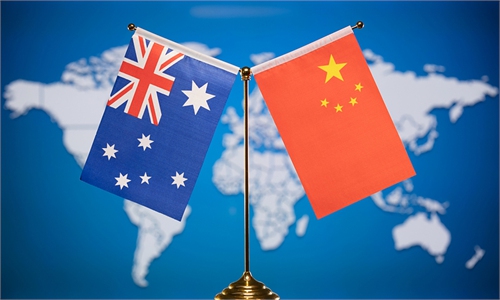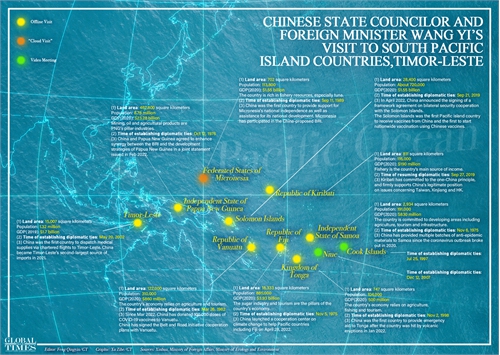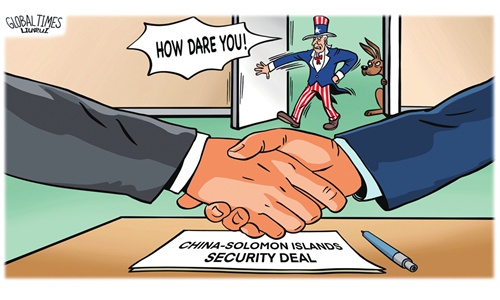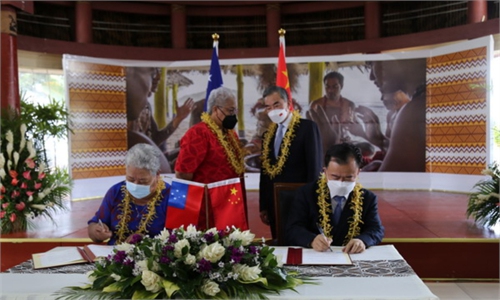Alliance with US gives Australia little room for maneuver in relations with China: former Australian Diplomat
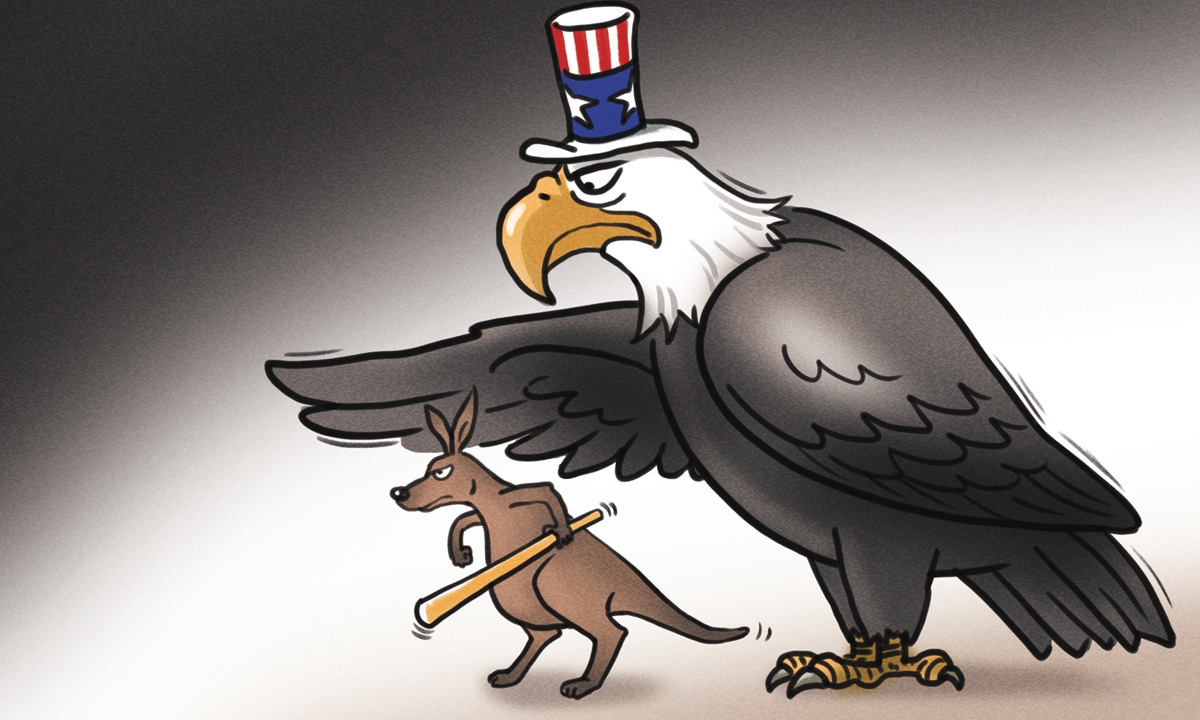
Illustration: Liu Rui/GT
Editor's Note:Chinese State Councilor and Foreign Minister Wang Yi is on a tour to eight South Pacific island countries, which has touched raw nerves in Australia and the US. Prior to Wang's visit, China and the Solomon Islands in April signed a security agreement to enhance cooperation, to which Australia reacted with fury. How should we view Australia's opposition to the China-Solomons deal? With the Labor Party now in office, how will the Australian government deal with its relations with the Solomon Islands? Global Times (GT) reporter Wang Wenwen talked to John Lander (Lander), a former Australian diplomat, over these issues as well as the future of China-Australia relations. Lander worked in 1971-72 in the Department of Foreign Affairs upon Australia's recognition of the People's Republic of China. He was director of the China section of the department on three separate occasions in the years following his posting to Beijing. He was personally responsible for negotiating the establishment of consular relations between the two countries. He does not see the prospect of improvement of China-Australia relations in the immediate future and he believes hostility toward China is not in Australia's best interests. He has agreed to this interview on the understanding that he is not speaking on behalf of China and these are views as to what he feels is in Australia's best interests.
GT: The election of Anthony Albanese as Australia's new prime minister has raised discussions about the future prospects of China-Australia relations. How do you analyze the China-Australia relations under the Albanese administration?
Lander: Immediately after the election of the Labor government and the appointment of Anthony Albanese as prime minister, quite a number of people, here in Australia, but also in China, saw an opportunity for what they called a "reset" of Australia-China relations.
Some even seemed to feel that we may be able to go back to the mutually beneficial and cordial relationship we had prior to 2010, that I and many of my colleagues back in the 1970s and 1980s worked so hard to develop.
But I do not see that occurring. The prospects for a return to the previous relationship are very slim. And the indications emerging from the meeting of the Quad in Tokyo in the last couple of days are that Mr Albanese has basically doubled down on the centrality of the US alliance for Australia, in determining both its foreign policy and defense policy.
He also offered the British prime minister reassurance that Australia is strongly committed to the AUKUS arrangement as well. And despite Presidents Biden's disclaimer to President Xi Jinping a few weeks ago that these US alliances were not directed at China, I think everybody understands very clearly that they are. Albanese has made it quite clear that under his government, Australia will continue to stay very close to the US policy line in regard to China.
So there's not much room for maneuver for Australia. As long as the United States policy designates China as the principal threat to the international "rules-based order," Australia, because of its alliance with the US, will feel obliged to maintain a certain level of hostility toward China. I think that is very unfortunate and not in Australia's best interests, but I can't see any other prospect for the immediate future.
We are more or less caught up in what I would call the "suffocating embrace" of the US. In every war that the US has been engaged in since WWII, Australia has always joined in on the side of the US when asked to do so and President Biden's statements in Tokyo at the time of the Quad meeting raise the prospect that eventually there may even be war with China.
There is another sign that things are not going to progress much. That is Mr Albanese's rather churlish response to Premier Li Keqiang's congratulatory message. Premier Li used extremely conciliatory and carefully chosen language. In particular his proposal that Australia and China should "review the past" seemed like an overture to Australia to discuss the bans on a number of Australian agricultural and other exports imposed in the recent past.
If Albanese had replied using similar diplomatic language, expressing a willingness to enter into discussions on the basis of mutual respect and mutual benefit, there would have been a chance of resuming dialogue between the two governments, at a senior level.
But he adopted the attitude that China must first rescind all the bans on Australian products and then talks can start. I may be wrong, but I do not expect that the Chinese government would, in fact, do that. I think that's a step too far. They have indicated through this very diplomatic language that they're willing to discuss those matters with Australia, which is the first step. But I don't think that they would be willing to go so far as to simply rescind all the bans unilaterally prior to any discussions with Australia.
GT: Compared with the Morrison administration, will the Labor government strike a new balance between China and the US?
Lander: Prime Minister Albanese has made it very clear that Australia is going to stick very closely to the existing historic relationship with the US. Because of that, it's fairly clear that Australia will continue to act at the behest of the US.
The military alliance of Australia with the US is extremely deeply rooted in Australia. Australia is very heavily influenced by the US culturally, economically, financially, and militarily. For Australia to attempt to move away from or partially repudiate the US alliance would be almost impossible and certainly very dangerous. That would invite retaliation or punishment by the US on Australia.
The Australian government's position is very much dictated by the belief that Australia has more to lose by moving away from the US than it has to gain by moving toward China. We are not in a position where we can actually strike a balance between the US and China. The US has made it very clear that Australia has to take a side. If we choose to be with China while trying to remain with the US, the US will not accept that.
I believe that Australia's room for maneuver is extremely small and the process of creating an independent foreign and defense policy will be in slow and very small steps. Over considerable time, we may be able to achieve some distancing from the current type of connection with the US policy. But it will take a lot of diplomatic skills on the part of Australia to achieve anything like an independent foreign policy or independent defense policy. Neither of these is currently achievable.
GT: China and the Solomon Islands have signed an intergovernmental framework agreement on security cooperation, which Australia has strongly opposed. There were media reports that an invasion of the Solomon Islands was being considered by Australia. Now with Labor in office, how will the Australian government deal with its relations with the Solomon Islands?
Lander: I think Australia's attitude to the Pacific is extremely paternalistic and also very neocolonial. One of the things that Australia is going to have to do is to adopt a more respectful approach to the independence and the sovereignty of the Pacific island countries and to treat them as equals rather than as some kind of subservient partners. I think this has been the problem also with the US in all of its dealings with every country. It treats its allies as subservient to it, rather than equal, independent sovereign countries.
Australia's and the US' characterization of the Solomons agreement as a potential military base for China is an exaggeration and a panic reaction. And the implication of Morrison's statement about "red lines," which prompted Prime Minister Manasseh Sogavare to talk about the possibility of invasion by Australia, is all highly exaggerated. I certainly don't think that's going to happen under the Albanese government.Foreign Minister Penny Wong has already embarked on a diplomatic excursion through the whole of the Pacific, promoting much greater economic, cultural and social inter- connectivity between Australia and all of the Pacific island countries, including the Solomon Islands. I don't think that's going to actually result in any of those countries deciding to put a stop to the development of their relations with China. But I think Australia has made it clear that it will compete with China on the diplomatic and economic front rather than in a military way.
GT: Given that Australia is a part of AUKUS and the Quad, both of which take aim at China, do you think Australia's opposition to the China-Solomons deal is fair?
Lander: I am not prepared to make a value judgement like that. However, from what we know of the modest security provisions in the Solomons agreement with China, they bear no comparison with the basing arrangements under AUKUS. Given the secrecy surrounding the formation of AUKUS, which came as a complete surprise to the region, the accusation of a lack of transparency looks like a case of the "pot calling the kettle black."
Such a double standard is hardly likely to encourage the Solomons - or any other Pacific Island country - to take Australia into their confidence with regard to their future arrangements with China. This would explain the secrecy surrounding their joint discussions with Mr Wang Yi in Fiji.
GT: It fits the interests of South Pacific countries most when they develop their ties with different major powers. Do you agree with this viewpoint?
Lander: It's not for me to say whether they should or shouldn't. What I can observe is that it is unlikely that they would not do that. It is very clear that the possibility of the great powers competing for influence in the Pacific Island countries has already resulted in some benefits to them. The combined US-Australia policy, and China's policy, is to provide much more economic and infrastructure assistance to the Pacific Island countries, in particular to mitigate the effects of climate change. So it is obviously to their advantage to try to develop relations with both sides.
To what extent that would invite some form of violent retaliation by the US is really open to question. I have no idea how far the Pacific Island countries can go in developing their relations with China before provoking a stronger reaction from the US, or from Australia as the US proxy.
